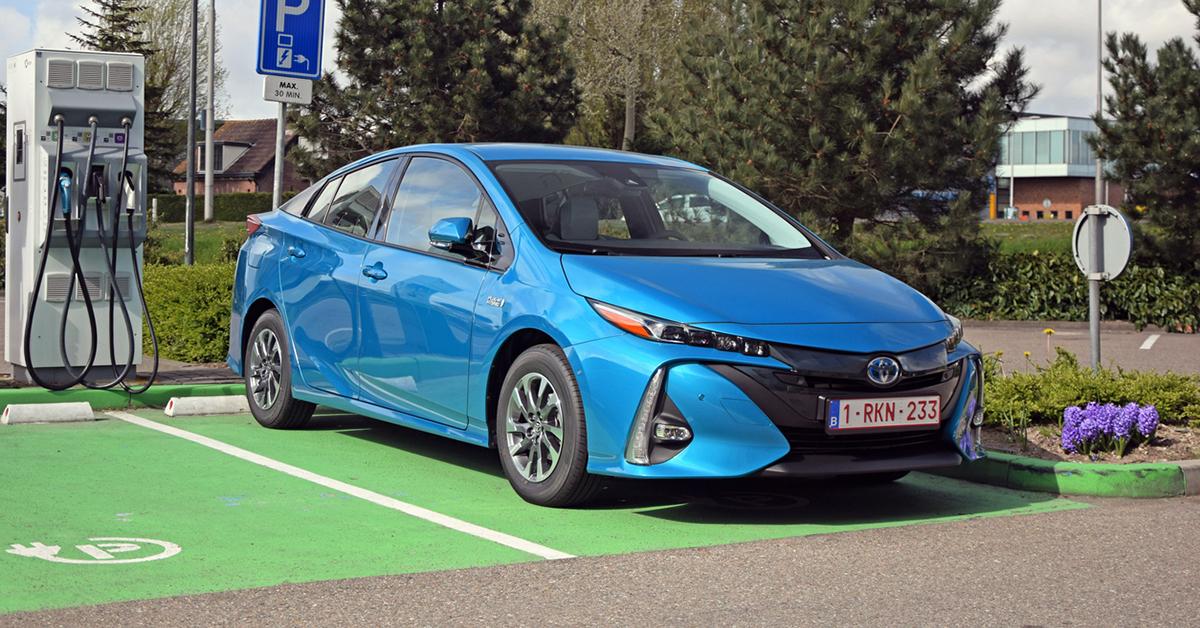A Complete Guide to the Electric Vehicle Tax Credit – What It Is, How to Claim It, and How Much You Could Potentially Save
Did you also know that purchasing an electric vehicle also comes with a significant financial incentive from the government?
Updated Jan. 16 2020, 5:36 p.m. ET

You may already know that electric vehicles have advantages such as saving you money on gas and allowing you to ride in the HOV lane at any time of day. That’s a win for your bank account and a massive win for your patience while sitting in primetime traffic on the highway. #Score! But did you also know that purchasing an electric vehicle also comes with a significant financial incentive from the government? Sure, electric cars may be more expensive upfront, but with electric vehicle income tax credit, rebate programs, and of course the change you save on gas, there’s a lot to be said for investing your hard-earned dollars in the more sustainable alternative.
What Is an Electric Vehicle Tax Credit?
Tax credits are tax incentives that give applicable taxpayers a refund of the amount of credit accrued from the total owed to the state or credits given in recognition of taxes already paid in an alternative way to the state, such as “support.” This credit is subtracted from the taxes a taxpayer already owes the government.
In a similar way that homeowners who opt for solar panels are often eligible for tax credits — or tax breaks — people who own an electric car may be eligible for an electric vehicle tax credit. In essence, an electric vehicle tax credit is the government recognizing that you opted for a more sustainable, eco-friendly car, so therefore it’s going to reward you monetarily.
According to CreditKarma.com, certain taxpayers may qualify for the federal Qualified Plug-In Electric Drive Motor Vehicle Credit, which “could give you back up to $7,500 when you file your federal tax return.” Also known as the federal Internal Revenue Service (IRC) tax credit for electric vehicles, the tax credit offers qualifying taxpayers anywhere from $2,500 to $7,500 back per new electronic vehicle bought in the United States. Determining how much tax credit you get back depends on a few different factors.

How Do Electric Vehicle Tax Credits Work?
If you are eligible for the Qualified Plug-In Electric Drive Motor Vehicle Credit, you could get back anywhere from $2,500 to $7,500 when you file your federal tax return. How much you receive in a tax credit depends on the size of the vehicle, make, model, and its battery capacity.
But that’s not all an electric vehicle can buy you in givebacks. According to CreditKarma.com, electric car owners may qualify for even more incentives depending on the state and city you live in. Utility-company incentives — such as rebates and discounts — could also drastically affect the amount of cash you save when buying an electric vehicle.
As with most incentives, the electric vehicle tax credit only lasts so long. According to Congressional Research Service, “The tax credit phases out once a vehicle manufacturer has sold 200,000 qualifying vehicles. Tesla and GM have reached this threshold, and credits for Tesla and GM vehicles will begin phasing out in 2019.”
Are Electric Vehicle Tax Credits Refundable?
According to TaxAct.com, “The Qualified Plug-In Electric Drive Motor Vehicle Credit is a non-refundable credit. A non-refundable credit can reduce your tax liability to zero, however, it cannot result in a refund.”
In layman’s terms, the dollar amount refund you receive depends on your tax liability, not how much credit you qualify for. In the event that your tax liability is zero, you wouldn’t receive a credit. Yes, despite qualifying for the tax credit. If you’re unsure of what a tax liability is, the term refers to the total amount of tax debt owed. So, if you owe $2,500 to the government in taxes, you can only receive as much as a $2,500 tax credit. Even if you are eligible for the full $7,500, you cannot make back more money than you owe the government in taxes.
Does Electric Vehicle Tax Credit Carry Over?
That would be nice, huh? According to the Congressional Research Service, “For individuals, the credit can only be used to offset a taxpayer’s tax liability in the current tax year (i.e., there is no carryback or carry forward. The credit is nonrefundable, meaning the amount of the credit cannot exceed a taxpayer’s tax liability.”
Again, in layman’s terms, an electric vehicle tax credit does not carry over for individual buyers. Because the tax credit is given to people who buy an electric vehicle, the tax credit is only available during the same tax year as the car was purchased.
That being said, the rules for businesses that purchase electric vehicles are different. Business can carry their tax credit back a year or carry them forward 20 years. According to Congressional Research Service, “For businesses, the tax credit attributable to depreciable property used for business or investment purposes is treated as part of the general business credit. The general business credit can be carried back one year or carried forward for up to 20 years.”
Does Electric Vehicle Tax Credit Apply to Used Cars?
Auto Trader confirms that electric vehicle tax credits do not apply to people who buy used cars. Used electric cars cost whatever the price point is and won’t get you a tax credit come time to file your federal taxes.
Of course, car shoppers that go the used electric vehicle route may end up saving more money in the end. We’ve already established that electric plug-in vehicles could be the more expensive option upfront. Depending on the price point for which you score a used electric vehicle, it may end up being cheaper to buy a used electric car, even when taking into consideration the tax credit that new electric vehicles qualify for.
Which Cars Qualify for the Electric Vehicle Tax Credit?

For a full list of vehicles that currently qualify for the electric vehicle tax credit, you can check out this list on Efile.com. Included below is a condensed version that features one 2020 model from several different makes compiled from Autobytel:
- Chrysler Pacifica Hybrid
- Honda Clarity
- Jaguar I-Pace
- Kia Niro
- Mitsubishi Outlander PHEV
- Nissan LEAF
- Porche Panamera E-Hybrid
- Toyota Prius Prime
- Volvo XC90 Hybrid
When Does the Electric Vehicle Tax Credit Expire?
The electric vehicle tax credit is — at its core — an incentive, which means the government is essentially offering a reward for people to buy this specific product. But incentives only last as long as a certain amount of people cash in on them. If every single person in America bought an electric vehicle and expected to cash in on the applicable tax credit, you can be there would no longer be a need for an incentive program. If people are already buying electric vehicles, then there’s no reason to entice them with money.
That being said, when does the electric vehicle tax credit expire? The tax credit phases out when manufacturers sell 200,000 of their qualifying cars, which is precisely why manufacturers like Tesla and GM are no longer eligible for the program. These credits were supposed to be phased out in 2019 with GM’s credit dropping to $1,875 in October 2019 and completely disbanding in 2020 and Tesla’s credit falling to $1,875 in July 2019 and completely expiring at the end of 2019.
However, both car manufacturers spent the bulk of 2019 lobbying Congress for an extension. GM and Tesla are working on the bill “Driving America Forward Act,” which seeks to grant electric car manufacturers a $7,500 tax credit for selling an additional 400,000 vehicles on top of that already approved 200,000 vehicles, according to Reuters. The “Driving America Forward Act” would also extend the hydrogen fuel cell credit through 2028.
How to Claim Electric Vehicle Tax Credit
If you’ve gotten this far and it sounds like the electric vehicle tax credit is for you, then look no further. To claim your electric vehicle tax credit, you have to do so when you file your federal taxes for the tax year. You’ll need to fill out IRS Form 8936 (Qualified Plug-In Electric Drive Motor Vehicle Credit).
If you are claiming the tax credit as an individual who purchased an electric vehicle for personal use, you’ll report the credit from Form 8936 on the appropriate line of Form 1040, U.S. Individual Income Tax Return. To read up about the laws regarding the Plug-In Electric Drive Vehicle Credit page on the IRS website here.
How to Apply for Local Rebates and Incentives
As mentioned above, the electric vehicle tax credit is a federal tax credit, but there are also other incentives at the state and local levels. Rebate incentives are more immediate than a tax credit, as tax credits don’t get filed until the next tax year. With rebates, which your state or local legislation may allow, you would instead see an immediate cut in the price of the electric vehicle. This is because the state government pays the dealer directly and you end up with a lower price point. According to U.S. News, some states or municipalities even offer rebates for those who install electric vehicle charging stations at either their personal homes or businesses.
Then, there’s reductions in sales, excise tax, carpool lane access, and free or reduced parking, which some states and municipalities offer. Local utility might also provide credits, discounts, or lower rates that can save you money in the long-run and lower your energy consumption.
Specifically, if you live in Colorado, buying an electric vehicle is well-worth it. After all, Colorado offers the highest additional incentive on top of the federal government’s tax credit that goes up to $7,500. In the State of Colorado, electric vehicle buyers can qualify for a credit up to $5,000 in addition to the federal tax credit. That’s as much as $12,500 off your electric vehicle.